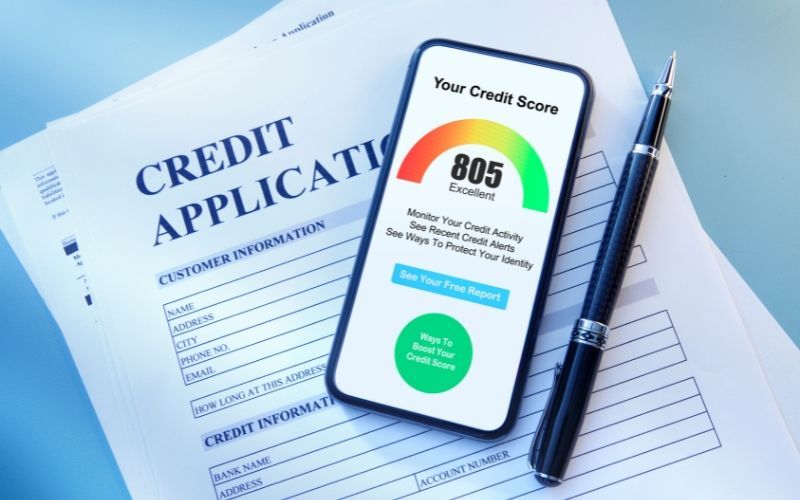Last Updated: August 1, 2024
Your Credit's Silent Influencers: The Hard and Soft of Inquiries

Disclaimer: We are not qualified legal or tax professionals and are not giving advice. Always speak with a qualified professional before making any legal or financial decisions.
Your financial journey is influenced by various factors, including inquiries into your credit history. Hard inquiries can temporarily lower your score, while soft inquiries don't affect it. Understanding these different types of credit pulls helps you manage your credit health more effectively. This knowledge allows you to make informed decisions as you pursue your financial goals.
If you'd like to skip the article and speak to a debt specialist right away, click here for a free consultation.
What is a Hard Credit Pull?
A hard credit pull occurs when a lender reviews your credit history before approving a new credit application. These credit pulls help assess your creditworthiness for various products, including loans, credit cards, apartments, and utilities. Hard inquiries are typically initiated when you apply for services requiring a thorough credit check.
Common examples include:
- Mortgage or auto loan applications
- Student loan or personal loan applications
- Credit card applications
- Apartment or home rental applications
- Applications for utilities like electricity, gas, cable, etc.
- Cell phone contract applications
The key distinguishing feature of a hard pull is that it requires your authorization and permission. The company, financial institution, or lender cannot access your credit report without your go-ahead. For more insights on this topic, you can refer to this U.S. government article.
Hard credit pulls occur when you apply for loans or credit cards, requiring your consent for lenders to check your credit. These inquiries can slightly lower your credit score, typically by 1-5 points. The impact varies based on your credit profile, with those having lower scores potentially experiencing a more significant dip.
Multiple hard credit pulls in a short time may signal risk to lenders, potentially making it harder to qualify for new credit. While these inquiries remain on your report for two years, their impact on your score usually fades after about 12 months.
It's a good idea to check your credit score around this time to ensure the hard pull is no longer negatively affecting your credit standing.
What is a Soft Credit Pull?
In contrast to hard credit pulls, soft credit pulls do not affect your credit score at all. A soft pull, also called a soft credit inquiry or inquiry, occurs when your credit report is accessed for information reasons not related to a specific credit application.
Some common examples of soft pulls include:
- Checking your own credit report or credit score
- Pre-qualification checks by lenders
- Prescreened credit card or loan offers
- Potential employers doing background checks
- Landlords screening rental applicants
- Insurance companies checking your eligibility for a policy
Soft credit pulls don't require your direct authorization and have no impact on your credit score. These include background checks by employers or landlords, and when you check your credit. While soft pulls may appear on your credit report, they're invisible to lenders and don't affect score calculations.
Unlike hard inquiries, soft credit pulls usually do not lower your score. Both types remain on your credit history for two years, but only hard pulls influence your creditworthiness. Regular self-monitoring through soft pulls is recommended and won't harm your credit score.
Key Differences Between Hard and Soft Credit Pulls
To summarize the major differences:
| Hard Credit Pulls | Soft Credit Pulls |
|---|---|
| Requires you direct Authorization | Does not requires Authorization |
| Visible to other lenders on credit reports | Not visible to other lenders on credit reports |
| Has a negative impact on credit score | Has no impact on credit score |
| Examples: Loans/ Credit card Application, Apartment Rentals | Examples: Checking your own credit, Pre-approvals, Employer checks |
| Stays on report for 2 years, affects score for 1 year | Stays on report for 2 years but does not affect score |
Limit hard inquiries to when actively seeking new credit, as they temporarily impact your score. Soft credit pulls don't affect creditworthiness and can occur anytime. Monitor your credit regularly through soft checks, but apply for new credit judiciously to avoid multiple hard pulls in a short time.
How Long Do Inquiries Stay on Your Credit Report?
As noted above, both the hard pull credit inquiry and soft inquiries remain visible on your credit report for two years. However, hard pulls affect your credit score for a much shorter duration. Here is a quick rundown:
Hard inquiries
Remain on your report for 2 years but only affect your scores for about 12 months. After that initial impact, they remain on the report but the effect on your credit score diminishes.
Soft inquiries
Soft credit pulls can remain on your report for 2 years without affecting your scores. Regularly checking your credit report helps monitor these inquiries for accuracy. Unrecognized hard credit pulls could signal identity theft, requiring prompt action.
While hard pulls can temporarily impact your score, maintaining good credit habits will help your score recover within a year, even though the inquiry stays on record for two years.
The Rate Shopping Exception for Hard Pulls
When comparing offers for mortgages, auto loans, or student loans, multiple credit pulls are often necessary. Fortunately, credit scoring models have a rate shopping exception. Within a 14 to 45-day window, they count multiple pulls for the same purpose as one inquiry, allowing you to find the best deal without repeatedly impacting your credit score.
The specific grace period depends partially on the scoring model used:
- VantageScore: Within a 14-day window
- FICO scores: Within a 45-day window
When loan shopping, compare options within two weeks to bundle credit pulls and minimize score impact. While soft inquiries are ideal, the rate shopping exception protects your score when multiple hard credit pulls are needed to find the best terms.
How to Dispute an Unauthorized Hard Pull
Checking your credit report regularly is wise financial practice. Among other things, this allows you to monitor your credit inquiries and ensure their accuracy. If you notice a hard credit check on your report that you don't recognize or did not authorize.
Here are some important steps to take:
Reach out to the creditor
Contact the business or lender that conducted the inquiry. There could be an innocent explanation, such as a case of mistaken identity or clerical error. The company may be able to resolve the issue quickly by retracting the unauthorized credit check.
Dispute the inquiry with the credit bureau
Each credit bureau (Equifax, Experian, TransUnion) has a formal dispute process you can initiate online or by mail. Explain that the hard inquiry was conducted without your permission and should be removed from your credit report. By law, the bureau must investigate within 30 days. If verified as an unauthorized loan amount or hard pull, they will remove it from your credit report.
File a complaint
If you notice unauthorized hard credit pulls, you can file a complaint with the Consumer Financial Protection Bureau (CFPB) to trigger an investigation. For suspected identity theft, report it at IdentityTheft.gov, where the FTC provides a recovery plan.
Quickly disputing unauthorized inquiries is crucial to minimize unfair damage to your credit. By leveraging consumer protections and being persistent, you can often succeed in removing invalid hard credit pulls from your report, preserving your credit standing.
How to Minimize the Impact of Hard Credit Pulls
While a single hard credit check causes little harm, accumulating too many in a short period can ding your credit score and make lenders wary. Consider using prepaid credit cards to build credit without the need for hard pulls.
Here are some tips to minimize the impact:
Space out applications
Avoid applying for multiple credit cards or personal loans within a few months. Spread out applications by several months to limit hard checks in a short timeframe.
Check pre-approval options
Many lenders allow you to check your pre-approved rates with a soft pull first. This helps you shop loan payments around with less risk.
Compare rates efficiently
For large loans like mortgages and auto loans, limit hard applications to 2 weeks to benefit from the rate shopping exception.
Boost your credit first
Take time to improve your credit score before applying for new credit. This will help soften the blow of any hard pulls. Pay down debts, make timely payments, and correct errors on your report.
Review credit reports frequently
Regular soft checks on your credit help you monitor inquiries. Dispute any unauthorized hard pulls quickly to limit the damage.
Limit new credit cards
Be selective with credit card applications, as each typically results in a hard credit pull. Space out applications and practice prudent financial habits to maintain credit access while minimizing score impacts. Understanding the difference between soft and hard credit pulls helps manage your creditworthiness effectively.
Why Checking Your Own Credit is a Soft Pull
Hard inquiries can impact your credit score, but checking your own report doesn't. When you review your credit, it results in soft credit pulls that don't affect your score. Ordering reports directly from Equifax, Experian, or TransUnion counts as self-checking and only creates these harmless soft inquiries.
Other methods also result in soft inquiries:
- Use AnnualCreditReport.com to check your report from each bureau once per year.
- Ordering a report from a credit monitoring service like Credit Karma.
- Checking the credit score provided by your credit card company or bank.
- Review your report that a lender provides after you submit a loan application.
- Accepting those “free credit report” offers marketed heavily on TV and radio.
Self-checks don't usually affect your score. Monitor regularly for accuracy and to detect identity theft. Soft credit pulls from these checks won't impact your creditworthiness. Use AnnualCreditReport.com for free weekly reports through 2023, and check proactively.
FAQs
Conclusion
Monitoring your credit report is crucial for maintaining good credit health. Understanding the difference between hard and soft credit pulls helps you manage your creditworthiness effectively. Hard inquiries from new credit applications can cause small, temporary score drops. Limiting these inquiries is wise, as too many in a short period can negatively impact your ability to qualify for loans or credit cards.
Soft credit pulls don't usually affect your score, so frequent self-monitoring is recommended. Checking your own credit report is always a soft pull, allowing you to stay on top of your
credit usage and payment history without penalty. Regular monitoring, disputing errors, and judicious new credit applications help minimize hard inquiry impacts. Developing wise financial habits over time is key to long-term credit health.
If you are struggling with overwhelming debt and want to explore your relief options, Pacific Debt Relief offers a free consultation to assess your financial situation. Our debt specialists can provide objective guidance to help find the right debt relief solution.
*Disclaimer: Pacific Debt Relief explicitly states that it is not a credit repair organization, and its program does not aim to improve individuals' credit scores. The information provided here is intended solely for educational purposes, aiding consumers in making informed decisions regarding credit and debt matters. The content herein does not constitute legal or financial advice. Pacific Debt Relief strongly advises individuals to seek the counsel of qualified professionals before undertaking any legal or financial actions.
Reduce Your Credit Card Debt By Up to Half

BBB Reviews | 4.9/5.0 Rating









 Do Not Sell My Personal Information
Do Not Sell My Personal Information